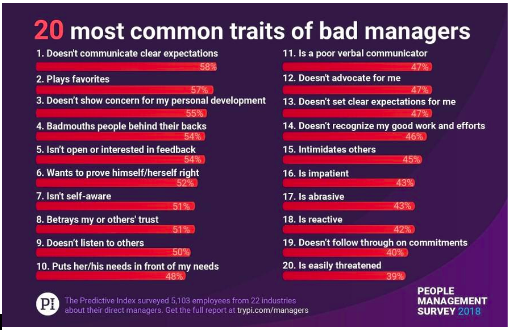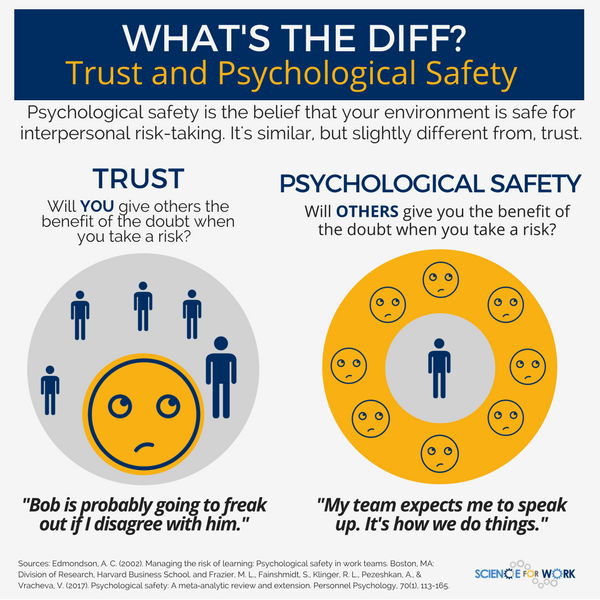5 Statements a Great Leader Never Says (Part 2)
There were many contributions from my online community regarding statements they’ve heard from leaders. People from various countries (United States, India, and Germany) shared these statements from their leaders that hurt their workplace culture and brought team morale down. As leaders, we can learn from these statements and humbly address how expressing words like these steam from hurt, control, or fear in our own hearts and minds. Consider if you as a leader have ever said things like this to your employees and how you could vulnerably work to be a more inspiring leader who provides their employees with a more psychologically safe team culture.
1) “You shouldn’t have delegated work in that project. I assigned it to you.”
This is micromanaging to the core. Great leaders know that when you assign responsibility to a team member, you must also give them the authority to manage the project in a way that will make it have a successful outcome.
Consider Brené Brown’s tool for team projects:
T - Who owns the task?
A - Do they have the authority to be held accountable?
S - Is it agreed that they are set up for success (time, resources, clarity)?
C - Is there a checklist of what needs to happen to accomplish the task?
(Brown has a PhD in Social Work and is author of her most recent book, Dare to Lead - get it, it’s transformational!)
Delegating is a skill that successful, effective leaders use to maximize the talent on their teams. As Greg Graves, former CEO of Burns & McDonnell, once said at a genKC “Grow to CEO” panel event, “If you’re not willing to delegate, welcome to mediocrity.” I’ll never forget that statement, as it gave me freedom to use a few of my strengths; maximizing and communication.
2) “You’re too ambitious.”
Leaders need to support their team members’ career ambitions. Plain and simple. As a leadership instructor at Johnson County Community College once said in his course Effective Supervisory Training, “Your job as a supervisor is to 1) motivate & inspire your employees to perform with excellence, and 2) remove any obstacles out of their way.” When employees come to you wanting to know how to get a promotion or a raise, don’t balk at their aspirations. They may seem impatient or as if they’re entitled, but let’s instead assume positive intent about them. Maybe they’re just really passionate about their job. Maybe they absolutely love the mission of your organization. Maybe they’re very driven and proactive. Whatever the reason, leaders need to support their team members.
So, what should a leader do if their employee is exhibiting a high level of ambition? Well, support them. Ask what their career goals are and why they’re striving for those things. Ask what obstacles are in their way of achieving their goals. If their skill set is not honed enough to warrant a promotion, coach them to perform better. Work with them in one-on-one meetings to improve the skills that they are lacking. Have candid conversations about their performance -- and not just once a year at a performance review. Conversations about performance and goal setting should occur at least monthly, and sometimes bi-weekly.
3) “No.” (Without an explanation.
Saying no isn’t always a bad thing; it can be a sign of having good, healthy boundaries at work to protect oneself from being overworked or doing things that aren’t a productive use of time. However, as stated in the FranklinCovey framework called The Speed of Trust, transparency is a vital behavior to practice. When working with other employees, having transparent, vulnerable conversations is an effective way to build trust. People are more likely to respect a leader who is humble and honest about what is going on in the business. Telling your coworkers “No” without an explanation isn’t a great way to build a strong, trusting relationship with them. They will start to feel disrespected, uncared for, and distant from the mission of the company. Ambiguity makes some people feel uncomfortable.
If there are things you truly can’t be openly transparent about, be transparent about that. For example, a good leader will use vulnerability and transparency to tell their team members that things will be changing, why that change is occurring, and when it will happen -- even when they can’t fully share what the changes will be. As Brené Brown says, “vulnerability does not equal disclosure.”
4) “You’re just lucky to have a job.”
This one hurts. I’ve heard it many times from clients when I am data gathering before creating workshops for their teams. I ask them, “How do you show your employees appreciation? How do you create a culture of psychological safety?” If they respond by saying, “We pay them. They’re just lucky to have a job.” I will stop them right there to unpack the heart of what they’re saying. It is my passion to help leaders change this mindset. We then talk about how their employees are not slaves, so giving them the basic most fundamental compensation for their time is not a way of showing appreciation and creating a positive workplace culture. Creating a healthy environment for all employees should be one major goal of every great leader.
As discussed in this article from The Atlantic, power can cause brain damage. This can appear as a lack of empathy, inability to read other people’s feelings, and not remaining humble as a leader. As Jim Collins writes about in his book, Good to Great, the great leader Darwin Smith once said, "I never stopped trying to become qualified for the job." Now that is some true humility. Great leaders get to know what their employees on the ground level are really struggling with and succeeding at. They get their hands dirty. They do what it takes to make their organization a great place to work.
5) “Did you hear what [insert name here] did?”
Gossiping with your team members may feel like you’re bonding with them and being part of the team, however, it’s one of the biggest ways to lose respect from your employees. According to The Predictive Index People Management Survey, bad mouthing people behind their back is on the list of the top twenty traits common among bad managers. A great leader doesn’t use time with their employees to gossip or complain about other coworkers. This especially goes for human resources managers. It is absolutely not appropriate or ethical to talk about employees’ behavior, discipline, medical information, etc. with any other employee unless absolutely necessary with their manager. If you need to vent about someone or something at work, talk with your family or friends, or join SHRM in order to find other people in your field who could advise you on HR matters.
If someone at work is trying to gossip with you (whether you’re a leader or not), some ways to respond are by saying things like, “I’m not comfortable discussing that person when they’re not here”, or as Brené Brown suggests, “That’s not my experience with that person.” This helps create a culture of psychological safety -- a culture where people are comfortable being themselves and can trust that their team members will give them the benefit of the doubt and show them grace when they mess up. They are clear about what is expected of them and feel more freedom to be innovative and creative because they believe their team members will show loyalty to them. As stated in the Harvard Business Review article, High-Performing Teams Need Psychological Safety. Here’s How to Create It, “Studies show that psychological safety allows for moderate risk-taking, speaking your mind, creativity, and sticking your neck out without fear of having it cut off — just the types of behavior that lead to market breakthroughs.” It is good for business to create a psychologically safe workplace where your employees feel empowered to innovate.






